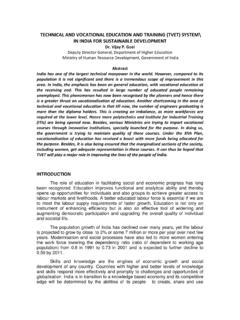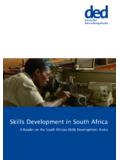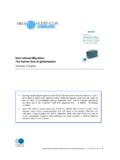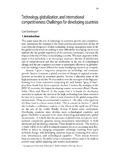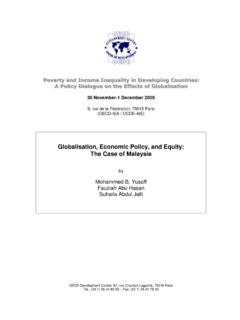Transcription of A PROGRAMME FOR THE TRANSFORMATION OF …
1 GENERAL NOTICE NOTICE 1196 OF 1997 education White Paper 3 A PROGRAMME FOR THE TRANSFORMATION OF higher education Department of education Pretoria 24 July 1997 TABLE OF CONTENTS Foreword Chapter 1 - Challenges, vision and principles o Introduction o Purposes o Needs and challenges o Vision o Principles o Goals Chapter 2 - Structure and growth o A single co-ordinated system o Planning in a single co-ordinated system o Equity and growth o Equity and redress o Restructuring and diversification o A qualifications framework for higher education o A quality assurance system for higher education o Admission and selection procedures o Language policy o Research o Capacity building and human resource development Chapter 3 - Governance o TRANSFORMATION o A model of governance o Governance at system level o Institutional governance Chapter 4 - Funding o Expansion.
2 Costs and resources o Goal-oriented, performance-related public funding o A new public funding formula o Earmarked funding o Accountability FOREWORD The release of the education White Paper 3 - A PROGRAMME for higher education TRANSFORMATION , is the culmination of a wide-ranging and extensive process of investigation and consultation that was initiated with the establishment of the National Commission on higher education (NCHE) in February 1995 by President Mandela, and the subsequent release of the Green Paper on higher education in December 1996 and the Draft White Paper on higher education in April 1997. This extended consultation is a concrete expression of the democratic will that is the motorforce of our emerging nation and reflects my Ministry's commitment to stakeholder participation in the development and formulation of policy.
3 The consultative process has resulted in the building of an all-embracing consensus around the broad policy framework outlined in this White Paper and has ensured that it commands the support of all the key stakeholders in higher education . It has also laid the foundation, in line with my Ministry's commitment to cooperative governance, for all of us together, to jointly embark on the long and exciting journey towards the TRANSFORMATION of the higher education system. The TRANSFORMATION of the higher education system to reflect the changes that are taking place in our society and to strengthen the values and practices of our new democracy is, as I have stated on many previous occasions, not negotiable.
4 The higher education system must be transformed to redress past inequalities, to serve a new social order, to meet pressing national needs and to respond to new realities and opportunities. The White Paper outlines the framework for change, that is, the higher education system must be planned, governed and funded as a single national co-ordinated system. This will enable us to overcome the fragmentation, inequality and inefficiency which are the legacy of the past, and create a learning society which releases the creative and intellectual energies of all our people towards meeting the goals of reconstruction and development. I have no doubt that the journey is not likely to be easy. However, I am confident that if we collectively commit ourselves to completing it in the spirit of the consensus that has already been achieved, we will reach our destination, that is, a higher education system that contributes to the building of a better life for all.
5 Prof S M E Bengu, MP Minister of education August 1997 CHAPTER 1 CHALLENGES, VISION AND PRINCIPLES INTRODUCTION South Africa's transition from apartheid and minority rule to democracy requires that all existing practices, institutions and values are viewed anew and rethought in terms of their fitness for the new era. higher education plays a central role in the social, cultural and economic development of modern societies. In South Africa today, the challenge is to redress past inequalities and to transform the higher education system to serve a new social order, to meet pressing national needs, and to respond to new realities and opportunities. It must lay the foundations for the development of a learning society which can stimulate, direct and mobilise the creative and intellectual energies of all the people towards meeting the challenge of reconstruction and development.
6 This White Paper outlines a comprehensive set of initiatives for the TRANSFORMATION of higher education through the development of a single co-ordinated system with new planning, governing and funding arrangements. PURPOSES higher education has several related purposes. In the context of present-day South Africa, they must contribute to and support the process of societal TRANSFORMATION outlined in the Reconstruction and Development PROGRAMME (RDP), with its compelling vision of people-driven development leading to the building of a better quality of life for all. These purposes are: To meet the learning needs and aspirations of individuals through the development of their intellectual abilities and aptitudes throughout their lives.
7 higher education equips individuals to make the best use of their talents and of the opportunities offered by society for self-fulfilment. It is thus a key allocator of life chances an important vehicle for achieving equity in the distribution of opportunity and achievement among South African citizens.. To address the development needs of society and provide the labour market, in a knowledge-driven and knowledge-dependent society, with the ever-changing high-level competencies and expertise necessary for the growth and prosperity of a modern economy. higher education teaches and trains people to fulfil specialised social functions, enter the learned professions, or pursue vocations in administration, trade, industry, science and technology and the arts.
8 To contribute to the socialisation of enlightened, responsible and constructively critical citizens. higher education encourages the development of a reflective capacity and a willingness to review and renew prevailing ideas, policies and practices based on a commitment to the common good. To contribute to the creation, sharing and evaluation of knowledge. higher education engages in the pursuit of academic scholarship and intellectual inquiry in all fields of human understanding, through research, learning and teaching. NEEDS AND CHALLENGES Assessing the current state of higher education in South Africa against the yardstick of these four general purposes, and the principles that are outline under below, the Ministry finds reason for concern and an imperative for TRANSFORMATION .
9 Despite acknowledged achievements and strengths, the present system of higher education is limited in its ability to meet the moral, political, social and economic demands of the new South Africa. It is characterised by the following deficiencies: There is an inequitable distribution of access and opportunity for students and staff along lines of race, gender, class and geography. There are gross discrepancies in the participation rates of students from different population groups, indefensible imbalances in the ratios of black and female staff compared to whites and males, and equally untenable disparities between historically black and historically white institutionst in terms of facilities and capacities.
10 There is a chronic mismatch between the output of higher education and the needs of a modernising economy. In particular, there is a shortage of highly trained graduates in fields such as science, engineering, technology and commerce (largely as a result of discriminatory practices that have limited the access of black and women students), and this has been detrimental to social and economic development. higher education has an unmatched obligation, which has not been adequately fulfilled, to help lay the foundations of a critical civil society, with a culture of public debate and tolerance which accommodates differences and competing interests. It has much more to do, both within its own institutions and in its influence on the broader community, to strengthen the democratic ethos, the sense of common citizenship and commitment to a common good.










